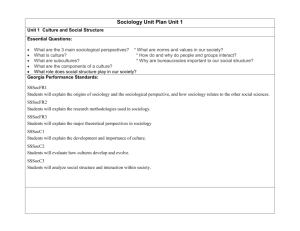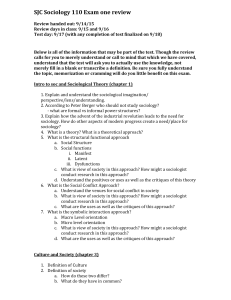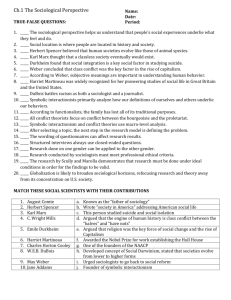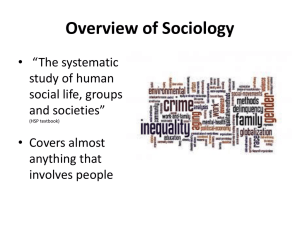Introduction to Sociology
advertisement
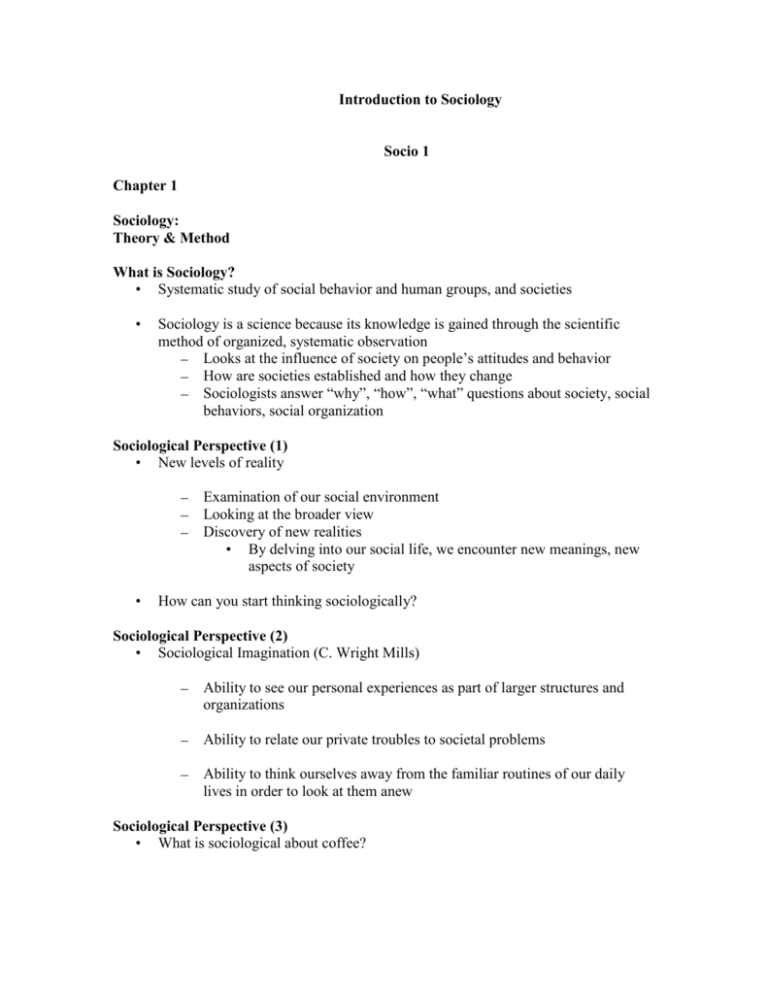
Introduction to Sociology Socio 1 Chapter 1 Sociology: Theory & Method What is Sociology? • Systematic study of social behavior and human groups, and societies • Sociology is a science because its knowledge is gained through the scientific method of organized, systematic observation – Looks at the influence of society on people’s attitudes and behavior – How are societies established and how they change – Sociologists answer “why”, “how”, “what” questions about society, social behaviors, social organization Sociological Perspective (1) • New levels of reality – – – • Examination of our social environment Looking at the broader view Discovery of new realities • By delving into our social life, we encounter new meanings, new aspects of society How can you start thinking sociologically? Sociological Perspective (2) • Sociological Imagination (C. Wright Mills) – Ability to see our personal experiences as part of larger structures and organizations – Ability to relate our private troubles to societal problems – Ability to think ourselves away from the familiar routines of our daily lives in order to look at them anew Sociological Perspective (3) • What is sociological about coffee? – It has a symbolic value in our daily life, and our social interactions (what is more important? Drinking coffee or the ritual that goes with it?) – Coffee also has health implications? Is it a drug? – Drinking coffee also means participating in globalization • Production, transport, distribution requires many social, political and economic relationships – Coffee can explain the historical social and economic development that led coffee to be mass consumed Sociological Perspective (4) • Sociological Imagination (C. Wright Mills) – – – Awareness of the relationship between an individual and society Challenging why things are “the way they are” It allows to think about events that seem to be individual issues and realize that they reflect larger social issues • Example: Poverty Studying Sociology • While we are all individuals, we are part of a society and take part in its social structure • Sociology allows you to understand: – what society makes of us and what we make of ourselves • The social structure represents the way we are shaped by our social environment, and how our actions shape society • Our social environment is structured and patterned (not random) – It conditions the way we behave – Societies are continually structuring themselves (organizing themselves around certain patterns) • Is a coffee just a thing? Does it represent many social interactions? Developing a Global Perspective • What is the relationship between the local and the global? • Societies are now more than ever connected – Advances in technology – Transportation • Globalization – Growth of world interdependence (networks) – However, the local is affected by the global • Do you have a global sociological imagination? Sociological Theories • Abstract interpretations, general explanations used to explain facts • Contrary to popular beliefs “facts do not speak for themselves” – Example: Black men hanging out on a corner • Theories guide researchers in their quest to explain complex facts Auguste Comte (1798-1857) • French theorist who coined the term Sociology • Study of society must be scientific (similar to the natural sciences) – Social Statics • Stability, order which keeps society together – Social Dynamics • Institutional development & social change Herbert Spencer (1820-1903) • English sociologist • • • • Was not interested in social change – Sociology was supposed to understood ONLY Compared study of sociology to study of an organism (biology) Society is made up of institutions as a body is made up of organs Developed Social Darwinism to understand social evolution of societies – Natural processes should not be interfered with – Influenced by Darwin’s Origin of the Species Karl Marx (1818-1883) • German theorist • Material conception of history – Research focused on the search for the principles of history that help economic environments to thrive – Dialectic Materialism • Development depends on clashes (class conflict) & creation of new societies (w/ revolution) • Capitalism: an evil to be overthrown for a classless society – Society is organized around two categories: • Owners of the means of production/bourgeoisie (capitalists) • Workers/proletariat (exploited) • Result = Class conflict Karl Marx (1818-1883) (2) • People should act in Praxis – Put theory into action towards: • Social change • Redistribution of resources • Marx is known as an economic determinist – Economic factors determine the fate of people • Fate depends on whether you own or not means of production • While he analyzed capitalism, it was somewhat obvious for him that a revolution would bring socialism Emile Durkheim (1858-1916) • French sociologist • Social integration – Density of social relationships • The more relationships, the stronger the sentiments which in turn strengthens groups • Social constraint – Societies exert social constraint over our actions – Society is more than the sum of individual acts • The structure is external to us Emile Durkheim (1858-1916) (2) • Division of labor – Organic solidarity • Modern societies are organized around specific complicated tasks – Consequence » everybody depends on somebody else, on cooperation • Social facts – Aspects of social life that cannot be explained in terms of biological characteristics • Includes moral and legal norms • Material social facts: Major institutions • Nonmaterial social facts: Social rules, symbols etc… • Anomie – Loss of direction that a society feels when social control of individual behavior becomes ineffective • Might lead to suicide – Individuals might lose important symbols and do not know how to act Max Weber (1864-1920) • Verstehen – It means “insight” or “understanding” in German – Difficult to objectively understand a phenomenon – We must learn the subjective meaning people attach to their actions (value-free sociology) • How do people explain their behavior? • Ideal type – Tool that helps generalize and simplify information – Serves as a yardstick to compare with reality • Bureaucracy – Organization that serves specific functions Harriet Martineau (1802-1876) • English sociologist – Remains today somewhat unknown because she was a woman • Developed social research methodology – When one studies society, one must look at the political, religious and social institutions – It should take into account women’s lives • Focused on new issues (at the time) such as feminism, race relations and domestic life W.E.B. Du Bois (1868-1963) • First American sociologist and first African American to obtain a Ph.D. from Harvard (still remains overlooked by today’s prominent sociologists) – Why? he was black • First theorist to develop analysis of racial inequality – Advocated social change • Double consciousness – Developing an identity through the lens of African-Americans’ experience in a white world • Understanding who they are (African Americans) • Understanding how they are being treated as black in a white world • Coined the famous phrase – “The problem of the 20th century is the problem of the color line.” Robert Merton • American sociologist • Distinguished between – Manifest functions • Openly stated and intended functions of an institution or system – Getting educated in a college setting – Latent functions • Unconscious or unintended consequences of an institution – Finding a husband/wife on a college campus – Dysfunctions • Disrupt social system or decrease stability – Crimes Microsociology • Detailed study of what people do or say – Detailed understanding of daily lives – Moment by moment – Example: Daily routine of a family. Who does what? At what moment? What does it mean for each household member? Macrosociology • Focuses on larger-scale organizations • Focuses on long-term processes • Focuses on broad social patterns – Example: Why is poverty still a major social problem? Theoretical Perspectives • Functionalism • Symbolic Interactionism • Marxism & Class conflict • Feminism & Feminist Theory • Rational Choice Theory • Postmodern Theory Functionalist Perspective (1) • a.k.a. structural-functional • View societies as a system of interrelated, interdependent parts • To study the function of a social activity is to analyze the contribution that that activity makes to the continuation of society • If a part is no longer necessary to the society, it will cease to exist • If a part is not doing its job, other parts of society will generally try to compensate in order to regain stability Functionalist Perspective (2) • Each part contributes to the stability and well-being of society by emphasizing moral consensus (agreement) and homeostasis (little change or status quo) • Assumption that most member of society share a consensus regarding core beliefs and values • Helps understands how the parts fit together • Tends to exaggerate consensus, integration. This perspective was once very popular. It has since showed its limits. • Example: when someone acts in a deviant act, other members of society will feel normal Functionalist Theorists • Auguste Comte • Herbert Spencer • Emile Durkhein • Robert Merton • Symbolic Interactionism • a.k.a. Social Psychology • This perspective is microsociology – Does not study large groups, institutions or societal trends – Study individual and small groups – Humans live in a world of meaningful objects, and attach meanings to objects and symbols – Society is possible because human beings have the ability to communicate • • Symbols We experience the world as constructed reality Symbolic Interactionist Theorists • George Herbert Mead – Small group interaction – Face to face encounters • Erving Goffman – Presentation of an image we want to achieve. – Present or hide certain facets of our personalities • Front stage • Back stage • Charles Cooley – Looking-glass self approach • We view of ourselves as we think others see us Marxism & Class Conflict (1) • Marxists focus on class conflict/divisions and power • Power refers to the influence one has on others to impose certain interests – Power can enforced through force or ideologies (ideas used to justify actions of the powerful) • Power, ideology and conflict are always closely related • Marxists study who benefits and suffers in society from class conflict and from other social phenomena – How do institutions reinforce privilege of some, suffering of others Marxism & Class Conflict (2) • Conflict is not always a bad thing; it can lead to change for the better – Example: Civil Rights Movement led to positive changes • Non-Marxists also focus on other sources of conflict – Race, religion, wealth etc… • Conflict theorists tend to see institutions as the problem while functionalists regard them as the organs of society Conflict Theorists • Karl Marx • W.E.B. Du Bois • Harriet Martineau • Immanuel Wallerstein Feminism & Feminist Theory • Feminism contests the idea that – Men’s experiences should be viewed as universal (usually male centered) – Women’s activities should not be hidden • Argues for political and social action to solve gender inequalities • Develops theories of oppression (from a feminist perspective) that many sociologists have overlooked Rational Choice Theory • Behaviors can be classified in four categories – Behavior towards higher values, such as politics – Behavior that is habitual, such as walking to school – Behavior that is emotional, such as loving – Behavior that oriented towards self-interest (also called “rational action”) • Rational choice theorists argue that if you had one variable to explain society, it would be self-interest and its maximization Postmodernism • It has been influenced by literature, art and politics • Very distrustful of science and of the principle of objectivity; Science has failed to solve social problems • Period dominated by mass media images and symbols but people should liberate themselves from images because they do not have any legitimacy anymore • Jean Baudrillard argues that electronic media has destroyed our relationship with the past, and that we are living in a make-believe world


